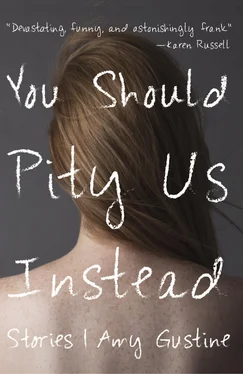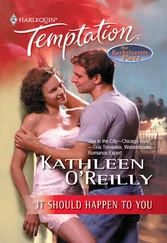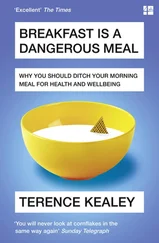Her plane lands, opening to air that smells like home, hot and dusty. She wears black to blend in with the married women. The customs official examines her blue passport closely, but it doesn’t arouse suspicions. Her last name is common in Israel, one of the favorites for immigrants looking to shed their European identities.
R’s mother spends the night in a hotel, and the next morning the young man at the front desk locates a driver to take her east. Two hundred and fifty miles on two-lane roads, her peripheral vision tainted by a head scarf. At one point the driver takes a dirt road that can’t go anywhere good and R’s mother thinks he’s figured out who she is and plans to make short work of a troublesome Jewish mother, but it turns out to only be a clever shortcut. The driver returns to pavement and in another few miles looks over his shoulder. “You are Jew, no?” he asks in English.
She hesitates. “Yes.”
He taps the dashboard. “I am Christian. The government, they kill my pigs, so I get this. They cannot kill a car, no?”
Many of the Christians in Egypt were pig farmers until the government slaughtered all the pigs to pacify Muslims worried about swine flu. R’s mother understands the garbage now. The pigs used to eat it. She smiles sympathetically. “They can kill anything, but for now you have a very nice car.”
Another few miles before the pig farmer asks why she is going to Rafah. “Not a good place for Jew.”
R’s mother considers whether to tell the truth. The Muslim government killed his Christian pigs. What are the chances she’ll find a more trustworthy Egyptian?
When she admits where she really wants to go, he looks shocked, then nods and holds up her money. “You pay me twice this, I get you to somebody. Understand? I know nothing.”
She affirms, “Nothing.”
In Rafah the pig farmer deposits R’s mother at one of the few open businesses, a market with red metal tables. The rest of the street is lined with chalky buildings leaning against one another. Most appear empty. The proprietor brings her a Sprite, staring at her a moment before going inside and shutting the door in a way that tells her she’s not wanted. At the red table she sits bolt upright, half-expecting to be shot from a passing car. They pass only rarely. When they do, R’s mother tightens the muscles around her spine. If she dies, she’d like to do it looking forward.
The pig farmer returns at dark and says he’s found her a place to stay. “Tomorrow, the tunnels.”
She offers an open hand of bills, and he selects five. “This is good.”
They drive through streets edged in dirt mounds and concrete shards to a building with a green flag. A woman shows R’s mother to a room with a white iron bed. That night she dreams of carrying R under a sky glittering with stars. When the earth opens up in a great zigzag crack, she drops him.
The next morning the woman brings her bread with a paste of mustard-flavored chicken and tells her a man is coming. R’s mother nods. A man is always coming.
The pig farmer returns. “Why do you go to Gaza?”
“My son is in there.”
The man asks who her son is.
She tells him.
There is a long pause. He repeats the name.
She nods.
He taps his temple. “You are not thinking.”
“I know.”
They sit awhile in silence until the man sighs. “Promise me you will not say his name. Tell them you have family, but make up a name. Do not tell them the real name.”
She nods again, and he hands her a bag with a thobe, slacks, and a white hijab.
“They will want to check you, understand? For safety.” He pats down his own chest and sides to demonstrate.
He returns after dark with a flour sack. “For your eyes.” She slips the sack over her head and submits to loosely bound wrists. They drive in what feels like circles for an hour before he helps her out of the car and unties her hands. They are in a home with pink floor tiles, a young man at the kitchen table. R’s mother hands over more money. The pig farmer and the man debate something in heated undertones until the pig farmer sighs and comes over. While he runs his fingers over her sides, her thighs, and then briefly, barely touching, over her breasts and buttocks, he keeps repeating, “I am sorry, I am sorry.”
The pig farmer and the other man leave. A boy remains, stationed inside the kitchen doorway. He watches her with a look of amusement alternating with blankness, as if he’s having brief seizures. Over the next hour two new men look in on her, each asking why she is here. She tells them her son is in Gaza and pulls out the older photographs. The men have all looked through her purse, but only for weapons. They showed no interest in the pictures.
At one point a woman comes in holding a newborn and looks to the boy. He gives no indication of approval or disapproval, so she sits down to nurse.
“Was it a difficult birth?” R’s mother asks in her passable Arabic.
“Easy,” she says. “It is my fourth.”
“Any more?”
“If Allah desires.” The woman’s tone says Allah is a pesky boss. “My first was hard.” She dips her head to indicate the boy. “Fifteen hours and he gets stuck.”
The woman describes her other children’s births and then the tales of nieces and nephews, neighbors and friends. Sick babies, big babies, small babies, babies who can’t wait, and babies who must be coaxed free. Babies who die.
“If Allah wants so many babies,” the woman asks, “why make them die?”
More men come, blindfold R’s mother and put her in a car. In a new kitchen two of them get down on the floor, heads inside a cabinet whose pressboard doors have swollen from water damage and cracked along the edge. They work silently, then pull the cabinet free to reveal a hole in the floor lined by wooden braces that act as both wall and ladder. One of the men helps her get a footing. As she descends, surprised by the muscle required to lower oneself into the earth, the air grows cooler and begins to taste of sulfur and iron. Breathing becomes difficult and her fingers begin to spasm from gripping the wooden braces.
At the bottom a man hands her a blanket. “Cold.”
The tunnel is twice the width of her shoulders, its height an inch above her own. Light bulbs dangle from exposed wires, and cigarette butts dot the dirt floor. Every six feet a wooden brace supports the roof. She fears losing her resolve, but the nonchalance of the men emboldens her, and she dares to ask why the tunnel smells of fish.
“You don’t let them take to the water,” her Egyptian guide explains, rubbing index to thumb in the universal symbol of cash, “so we bring them fish.”
At the tunnel’s end her guide fits a harness around her and uses a phone on the wall to give the order to lift. Three men pulley R’s mother from the earth. Her first glimpse of Gaza is a girl’s bedroom with blue birds flying in lonely, far-flung formation across a pink wall. In the corner four children sit on a dingy yellow bedspread playing a game with stones and broken crayons. One of the men unbuckles the harness and motions for her to follow him. They walk through a room which several families have divided with blankets and out the door to a dark street. The man is gone, the door shut, while R’s mother is still thinking about who painted those lonely birds.
•
The first night she sleeps behind a dumpster, and the next morning her bones feel as if they’ve been hammered. Gaza looks like she’d expected: half-buildings, debris-littered streets, dusty clothes, graffiti. The few women outside are accompanied by a man. Her resolve wavers until she spots a pair of older women alone, but when she arrays the pictures, whispering, “I am his mother,” they look frightened, shaking their heads, and quickly move on.
Читать дальше












